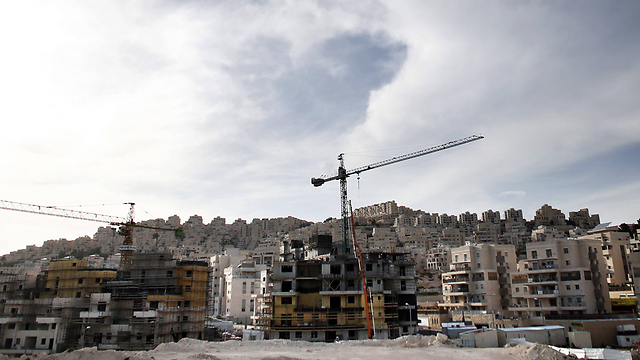Israel’s District Planning & Building Committee invites submission for building thousands of new homes in Arab East Jerusalem.
By Roi Yanovsky
The Interior Ministry’s District Planning and Building Committee on Monday invited the submission of a master plan for the construction of 2,200 new housing units for the Arab sector in the East Jerusalem neighborhood of Jabel Mukaber. As part of the plan, several hundreds of housing units built illegally will also be retroactively approved.

Construction in East Jerusalem – Photo: AFP
The decision was approved despite strong objection from right-wing activists. Aryeh King, a member of the Jerusalem city council who is leading the charge against the plan, sent an urgent letter to Interior Minister Gilad Erdan on Sunday, claiming there are issues with the project, because in reality, according to him, many more units will be built than initially planned.
The plan allocates an area of some 1,500 dunman between Jabel Mukaber and Abu Dis for the construction of housing units. The project also includes areas allocated for commercial and employment centers, public buildings, schools, new roads and new parks. The “American road” will also be developed as part of the plan, a central traffic artery for east and south-east Jerusalem, along which commercial and employment centers will be developed.
The district committee had also been scheduled to discuss the construction of 1,500 housing units in Jewish East Jerusalem neighborhood of Har Homa, but the meeting on that project was cancelled last week without explanation.
Planning and Building officials said the Har Homa plan was frozen for political reasons, noting the order not to hold the meeting came from above. The Construction Ministry claimed there was no professional reason to cancel the meeting, while the Prime Minister’s Office claimed the plans were not presented to them.
‘The plan helps divide Jerusalem’
Right-wing factions in the Jerusalem municipality made several different attempts to stop the Jabel Mukaber plan’s approval. According to King, “the state is approving construction of thousands of housing units for Arabs while at the same time freezing construction for Jews in the city’s eastern parts.”
King noted that in reality, the plans create a “territorial contiguity” of Arab neighborhoods between Abus Dis and Jabel Mukaber and with that helps divide Jerusalem.
“If we were wondering whether the mayor of Jerusalem was right- or left-wing, today we got our answer,” he said.
King defined the state’s policy as “zero enforcement” and “a reward for construction criminals.”
In the letter he sent Erdan, King presented correspondences between the Interior Ministry and the Jerusalem municipality, which raise claims that the plan contains significant planning problems. According to King, the area allocated for the plan and the density of buildings will eventually lead to four times the number of housing units being built.
“The plan uses green areas unnecessarily. The same number of housing units can be built in about a quarter of the area in buildings built at the acceptable height,” King said.
Right-wing activists’ plans to take the plan off the district planning committee’s agenda were unsuccessful. Four months ago, city councilman Moshe Leon submitted a request to hold another meeting on the plan, but his request was denied.
King, and the NGOs “Tevel b’Tzedek,” “Green Now” and “The Legal Forum for Israel,” also petitioned the Administrative Affairs Court, demanding the cancellation of the district planning committee’s decision to adopt the plan.
At the court hearing, Jerusalem municipality representatives rejected the claims made by opponents of the plan, saying the plan was vital for Jerusalem, which is in the process of resolving systematic planning failures that have been going on for years.
“The plan was approved as part of Mayor Nir Barkat’s policy of a united Jerusalem, which will be achieved by narrowing the gaps in the east of the city, upgrading the quality of life and taking responsibility for Arab neighborhoods in all walks of life – planning and construction, infrastructure, education, welfare and cultural, social and community activities,” the municipality’s representatives said.
The municipality representatives went on to say that, “the lack of planning led in recent years to a wide-spread phenomenon of illegal construction of some 20,000 structures, some built on public areas.” This, they said, meant many residents were not paying construction levies, creating land registry problems.
“In light of these failures, the mayor decided not to take the ‘head in the sand’ policy his predecessors took, and instead act to significantly change the situation,” they added.
The court dismissed the petition out of hand, saying it was too early to appeal the decision.
View original Ynet publication at: http://www.ynetnews.com/articles/0,7340,L-4642723,00.html






 Israeli New Shekel Exchange Rate
Israeli New Shekel Exchange Rate